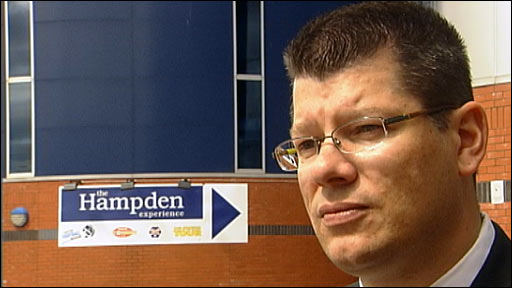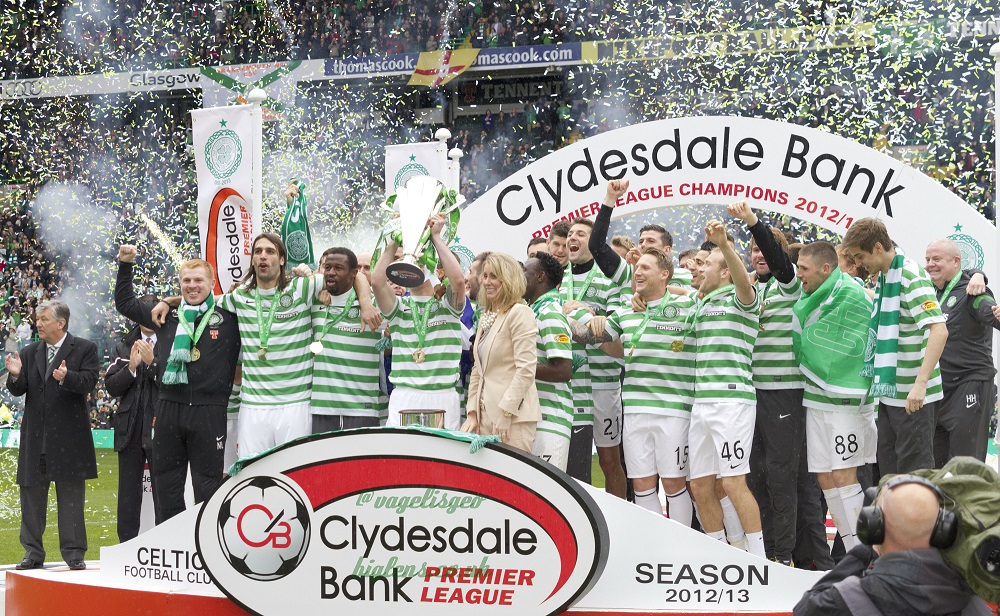Now those of us who are old enough to remember Jan Bartram will know that Graeme Souness is the beast, and you can make your own minds up about who the Messiah and Satan the Devil are in this particular battle. I feel this may not be the last mention of Souness in this particular story.
We are being told that £16m, £18m, who knows how many millions are about to be ripped from the game in Scotland, never to return. Sky will pull out because they don’t have 4 Glasgow derbies, ESPN will pull out, even though they have never shown a Glasgow derby. William Hill and all the other sponsors will pull out, all because Scottish Football needs one club, and needs that club to be strong.
Like most people by now, I’m fed up listening to all this doom and gloom about our game. Scottish football is the best supported per head of population in Europe. We may not be the most technical league in the world but fans turn out to watch their teams, and home produced players such as James McCarthy and Charlie Adam have shown that we still have footballers who can survive and thrive in the top leagues.
One thing that has surprised me throughout this whole newco/sevco drama is how fans of other clubs have mobilised and got their voices across, sharing my view that the game is not dying, it is about to be born again. It has changed my views on supporters of many clubs, particularly the likes of Hearts and Motherwell who I previously, erroneously, considered to be more RFC leaning. A new found respect has been evident between fans of all clubs, well almost all. I guess that this has taught us that we should be slower to make assumptions.
One assumption that is being made and thrown around in recent days is that a number of clubs could go out of business if we lose the TV deal, as this would represent such a massive drop in revenue that many clubs could not absorb it and survive. Solely on this basis, Stuart Regan and Neil Doncaster are trying to save Scottish football and not just one particular club.
Well what about relegation, surely that must have a negative effect on a club ? Should Stuart and Neil not be proposing that we do away with that as no SPL club could afford to be relegated, and as Craig Burley says the other clubs don’t matter anyway. Surely Kilmarnock’s precarious financial position is more at risk from them going down rather than from no TV deal.
I listened to Steven Pressley on Sportsound at the weekend. Now I’m not a massive fan of big Elvis, but I have to say he spoke very well and made a lot of sense. His point was that Falkirk had been relegated, had to cut their budgets, invested in youth, and were now seeing the benefits of that policy. Having watched his side beat Rangers and Dundee United on their way to narrowly losing to Celtic in the League Cup semi final, playing an attractive style of football, I had to agree with him that this could be a route forward for many clubs.
Falkirk were relegated in 2010 after 5 years in the SPL. Their turnover that season was £3.8m, having peaked at £5.1m the previous season when they reached the Scottish Cup Final. In 2011, their 1st season back in the SFL their income dropped to £2.4m, a greater than 50% drop in 2 seasons, yet their manager believes their club to be in a stronger position now, despite having to slash their wages budgets.
Consider the other clubs who have been relegated in the last 5 seasons.
Hamilton went down in 2011. In 2009 in the SFL their income was £1.1m, in the SPL in their relegation season in 2011 it was £2.95m. You would have to assume their income last year went back to 2009 levels or thereabouts, yet the club is still in business. They too have benefited from investment in youth with the sale of James McCarthy in 2010 helping them to generate a profit of c£900k that season.
Dunfermline had a turnover of £5.1m in 2007 when they went down, in the 4 subsequent seasons in the SFL their income dropped to an average of £2.25m before they came back up in 2011.
Inverness Caledonian Thistle were relegated in 2009. In their 1st season back in the SFL, in 2010, they lost around £950k with income down to £2m. Despite that they bounced straight back into the SPL, and in 2011 made a small loss of £200k on increased income of £3.5m.
No two clubs are the same, however you can see that clubs have managed to absorb the drop in income of around £1.5m between the SPL and the SFL without ending up in the same financial position as a team who had the benefit of the majority of the TV income and Champions League Income for 3 of the last 5 years. Instead of forecasting the end of the world, perhaps a pointer toward a more prudent approach, a licensing system which is robust and challenges income assumptions and a cap on wages as a percentage of turnover would ensure the survival of our remaining clubs. Financial rewards for blooding youngsters, and developing your own players ? These are areas that Doncaster and Regan should be discussing instead of shamefully bullying the SFL clubs, many of whose chairman and boards are emerging with great credit for their moral stance.
You may have noted there is one club missing from the list of relegated clubs. In 2008, Gretna finished bottom of the table , after going into administration in March of that season, albeit they were 11 points adrift at the foot of the table at that point and heading down in any event. Their problem was spending more than they earned to buy their way to the top. Their administrator could not guarantee that they could fulfil their fixtures for 2009, and accordingly they were relegated again, to SFL3. In August 2008, after resigning from the SFL, the club was liquidated, with debts of around £4m. A newclub was formed, Gretna 2008, who now play in the East of Scotland League.
Maybe Armageddon is coming after all, if we refer back to Wikipedia, after the battle between good and evil, “Satan will be put into the “bottomless pit” or abyss for 1,000 years”
Bottomless pit ? Abyss? SFL3 will do for me.
Follow the author on twitter @cardiffbhoy





